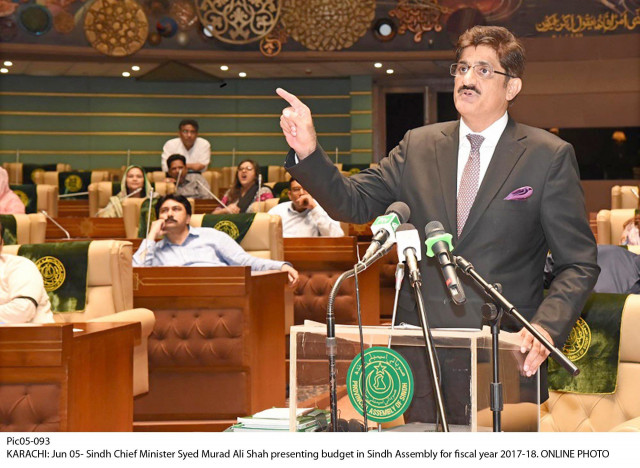FPCCI welcomes allocation of Rs1.5b but wants more
Says cost exceeds Rs10b, plants important for continuation of GSP Plus scheme

Sindh CM Murad Ali Shah presents the provincial budget for 2017-18 on Monday. PHOTO: ONLINE
He said that although this was a good start, these funds would not be enough as the total cost of five CETPs now exceeds Rs10 billion, for which he appealed to the federal government to release its 50% share, amounting to Rs5.5 billion.
Khursheed Shah believes Sindh not receiving its share of water
Despite repeated commitments, the Sindh government has failed to execute waste water treatment projects in Karachi for about a decade. Firoz requested Sindh Chief Minister Murad Ali Shah to take on board the Federation Standing Committee so that Sindh and FPCCI can jointly approach the federal government to release their share.
It may be mentioned that these five CETPs are crucial for complying with Pakistan environmental laws as well as for export purposes because foreign buyers are insisting on environmental compliances.
He said that these plants are important for the continuation of Generalised System of Preferences (GSP) Plus scheme, which has been granted by the European Union for ten years.
Environment experts and Karachi industrialists agree that these treatment plants are critical to the country’s exports as well as saving marine life because currently untreated industrial water is being dumped into the Arabian Sea.
Karachi industrialists have recently offered to bear the operational expenses themselves if the government completes these vital projects.
Sindh CM directs inquiry into illegal water outlets of Nara Canal
Through these plants, the industries would be able to treat surplus chemical for further use. Moreover, the used water and even sewerage water could be recycled and made reusable for industrial activities and other purposes.
On the directives of the Supreme Court of Pakistan, the Sindh Environmental Protection Agency (Sepa) in February 2017 issued over 300 notices to different factories on environmental grounds, which also included the closure of over 30 units in seven industrial zones of Karachi.
The agency had asked industries to install separate effluent treatment plants to process their waste water because it has become a big environmental hazard. However, industry representatives were of the view that the government should first fulfil its promise of setting up five combined effluent treatment plants in the industrial zones.
Published in The Express Tribune, June 7th, 2017.
Like Business on Facebook, follow @TribuneBiz on Twitter to stay informed and join in the conversation.



















COMMENTS
Comments are moderated and generally will be posted if they are on-topic and not abusive.
For more information, please see our Comments FAQ